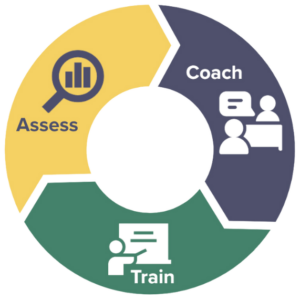Everyone wants to work for a capable boss, but what exactly does that mean? A high-performing leader is by definition good at their job, but true capability encompasses more than mere competence. Capable leaders make everyone around them better. They set a standard for excellence that permeates the entire organization.
Competence instills confidence, and employees are more likely to trust a leader who demonstrates deep subject matter expertise. A leader’s expert guidance can ensure the success of a project, even when it has been delegated to a less-experienced team member. Employees can more easily get the resources they need when their boss has a deep understanding of the process and the objectives.
The most capable leaders also have the emotional intelligence to inspire their team, develop meaningful relationships, and create psychological safety. They cultivate an inclusive workplace culture where everyone’s unique talents are appreciated and all employees can do their best work. These safe and collaborative environments spark innovation and efficient problem-solving, leading to higher employee satisfaction and better business results.
Leveraging Capability for Team Excellence

Capable leaders hold themselves to the highest standards of excellence. They are accountable, and because they follow through, they prove their trustworthiness on a daily basis to team members, colleagues, and superiors. High-performing leaders accept no excuses and get things done.
“Leading teams means examining what works best overall for the organization’s success, not pointing fingers or playing a blame game,” explains Kurt Merriweather, Vice President, Innovation, and Co-founder at The Diversity Movement. “If there’s friction, then a capable leader must work to break down barriers and create a culture where teams communicate and collaborate effectively.”
Competence and capability are integral to the success of diverse teams, since they are the bedrock of trust and mutual respect. Talent and expertise bolster a leader’s personal credibility. A winning mentality enables them to create a culture where teams communicate and collaborate. The most capable leaders can leverage the genius of the entire team to achieve best-in-class results.
When leaders attain the C-suite, the ability to perform at a high level is a given. Because there are bottom-line consequences when executives fail to meet their objectives, those on a leadership team have to be capable in their domain and expert in their subject matter. However, truly exceptional leaders add value to the entire team, exponentially increasing their impact. This aspect of capability is crucial for senior executives, says Donald Thompson, CEO and Co-founder of The Diversity Movement.
“I was working with the leadership team at a multi-billion dollar brand, and I had a candid conversation with one of their top performers. He ran the largest division, bringing in the most money, and he told me, ‘I always thought about doing my job, and reporting my numbers to our CEO. I didn’t understand my responsibilities as a part of his team and supporting my teammates,’” Thompson recalls.
“When you’re a leader on a high-performing executive team,” he says, “your capability set has to include communication, collaboration, and self-awareness.”
Master These 4 Skills to be a More Capable Leader
Capable leaders also understand that continuous improvement is necessary to meet the demands of a changing world. Highly effective leaders invest in lifelong learning, eagerly embrace feedback, and actively seek opportunities to enhance their professional expertise.
By honing your capability as a leader, you will gain the knowledge and skills required to navigate challenges, cultivate innovation, and advance your team toward collective success. To foster a culture of excellence, it’s vital to master effective delegation, problem-solving, teamwork, and meeting management. These pivotal skills will elevate your leadership to new heights.
- Empower your team through strategic delegation. Smart leaders use delegation to leverage individual strengths and ensure the entire team is aligned with overarching goals. Effective delegation ensures that the workload is distributed efficiently and fosters a sense of ownership and skill development among your employees. Successful delegation makes everyone on the team stronger.
- Actively contribute to problem-solving and decision-making processes. Encourage brainstorming sessions, leverage diverse perspectives, and implement innovative solutions. This effort will demonstrate that you are an analytical leader, and inspire resilience within your team. The result will be sharper problem-solving across the team and a more collaborative culture.
- Support those around you through good teamwork. Regularly check in on progress, address concerns promptly, and create an environment where open communication flourishes. Your availability for collaboration sets the tone for a responsive and supportive leadership style. In turn, meet deadlines for items requiring your review and approval. Timely feedback is crucial to keep projects on track and prevent bottlenecks. Make sure that your team can progress smoothly by providing prompt review. Being mindful in this area demonstrates reliability, while also instilling confidence in your team’s ability to execute.
- Hone the art of running effective meetings. Provide clear agendas, encourage open dialogue, and actively involve everyone. Ask intentional questions to ensure full collaboration and inclusion. Fostering an environment where all voices are heard leads to a culture of belonging and results in enhanced innovation and problem-solving.
Building capability is essential for leaders, but it takes more than personal commitment and must also include the drive to make your team better. Executives that master delegation, problem-solving, meeting management, and assembling strong teams are on the path to mastering capability. Honing these skills will make you a more effective leader and help the organization achieve lasting success.
Join the ranks of forward-thinking organizations that are harnessing the power of inclusive leadership to build stronger executive and managerial teams. Contact us today to learn how TDM LeaderView can transform your team and allow your organization to thrive.
Andy DeRoin is a project manager for the Product and Innovation department at The Diversity Movement. They are a diversity and inclusion educator with a background in social work and a passion for long-term, diversity-oriented initiative development, advocacy, and strategic alignment with organizational goals. Connect with Andy on Linkedin.












